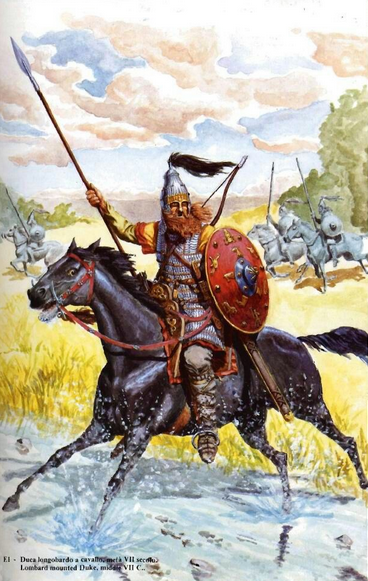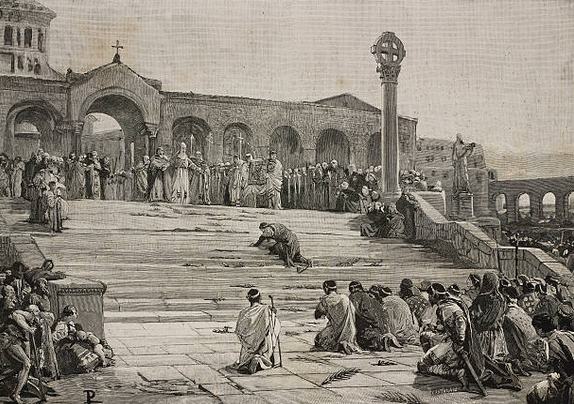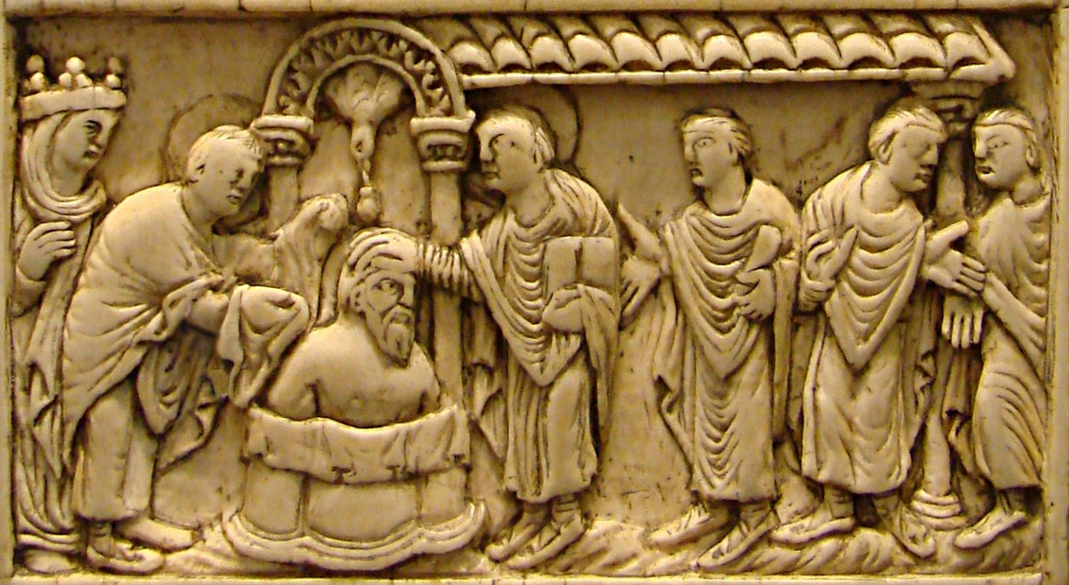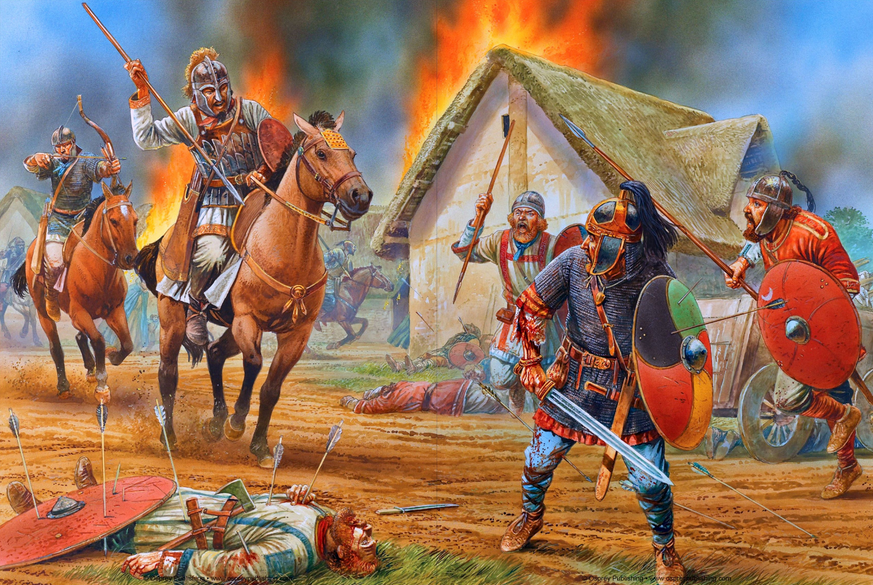Editor’s Note: The following comprises the fourth chapter of The Holy Roman Empire, by James Bryce (published 1871). All spelling in the original.
(Continued from Part 3)
CHAPTER IV
RESTORATION OF THE WESTERN EMPIRE
It was towards Rome as their ecclesiastical capital that the thoughts and hopes of the men of the sixth and seventh centuries were constantly directed. Yet not from Rome, feeble and corrupt, nor on the exhausted soil of Italy, was the deliverer to arise. Just when, as we may suppose, the vision of a renewal of imperial authority in the Western provinces was beginning to vanish away, there appeared in the furthest corner of Europe, sprung of a race but lately brought within the pale of civilization, a line of chieftains devoted to the service of the Holy See, and among them one whose power, good fortune, and heroic character pointed him out as worthy of a dignity to which doctrine and tradition had attached a sanctity almost divine.
The Franks, A.D. 486
Of the new monarchies that had risen on the ruins of Rome, that of the Franks was by far the greatest. In the third century they appear, with Saxons, Alemanni, and Thuringians, as one of the greatest German tribe leagues. The Sicambri (for it seems probable that this famous race was a chief source of the Frankish nation) had now laid aside their former hostility to Rome, and her future representatives were thenceforth, with few intervals, her faithful allies. Many of their chiefs rose to high place: Malarich receives from Jovian the charge of the Western provinces; Bauto and Mellobaudes figure in the days of Theodosius and his sons; Meroveus (if Meroveus be a real name) fights under Aetius against Attila in the great battle of Chalons; his countrymen endeavour in vain to save Gaul from the Suevi and Burgundians. Not till the Empire was evidently helpless did they claim a share of the booty; then Clovis, or Chlodovech, chief of the Salian tribe, leaving his kindred the Ripuarians in their seats on the lower Rhine, advances from Flanders to wrest Gaul from the barbarian nations which had entered it some sixty years before.

Few conquerors have had a career of more unbroken success. By the defeat of the Roman governor Syagrius he was left master of the northern provinces: the Burgundian kingdom in the valley of the Rhone was in no long time reduced to dependence: last of all, the Visigothic power was overthrown in one great battle, and Aquitaine added to the dominions of Clovis. Nor were the Frankish arms less prosperous on the other side of the Rhine. The victory of Tolbiac led to the submission of the Alemanni: their allies the Bavarians followed, and when the Thuringian power had been broken by Theodorich I (son of Clovis), the Frankish league embraced all the tribes of western and southern Germany. The state thus formed, stretching from the Bay of Biscay to the Inn and the Ems, was of course in no sense a French, that is to say, a Gallic monarchy. Nor, although the widest and strongest empire that had yet been founded by a Teutonic race, was it, under the Merovingian kings, a united kingdom at all, but rather a congeries of principalities, held together by the predominance of a single nation and a single family, who ruled in Gaul as masters over a subject race, and in Germany exercised a sort of hegemony among kindred and scarcely inferior tribes. But towards the middle of the eighth century a change began. Under the rule of Pipin of Herstal and his son Charles Martel, mayors of the palace to the last feeble Merovingians, the Austrasian Franks in the lower Rhineland became acknowledged heads of the nation, and were able, while establishing a firmer government at home, to direct its whole strength in projects of foreign ambition. The form those projects took arose from a circumstance which has not yet been mentioned. It was not solely or even chiefly to their own valour that the Franks owed their past greatness and the yet loftier future which awaited them, it was to the friendship of the clergy and the favour of the Apostolic See. The other Teutonic nations, Goths, Vandals, Burgundians, Suevians, Lombards, had been most of them converted by Arian missionaries who proceeded from the Roman Empire during the short period when Arian doctrines were in the ascendant. The Franks, who were among the latest converts, were Catholics from the first, and gladly accepted the clergy as their teachers and allies. Thus it was that while the hostility of their orthodox subjects destroyed the Vandal kingdom in Africa and the Ostrogothic kingdom in Italy, the eager sympathy of the priesthood enabled the Franks to vanquish their Burgundian and Visigothic enemies, and made it comparatively easy for them to blend with the Roman population in the provinces. They had done good service against the Saracens of Spain; they had aided the English Boniface in his mission to the heathen of Germany; and at length, as the most powerful among Catholic nations, they attracted the eyes of the ecclesiastical head of the West, now sorely bested by domestic foes.

Italy: the Lombards
Since the invasion of Alboin, Italy had groaned under a complication of evils. The Lombards who had entered along with that chief in A.D. 568 had settled in considerable numbers in the valley of the Po, and founded the duchies of Spoleto and Benevento, leaving the rest of the country to be governed by the exarch of Ravenna as viceroy of the Eastern crown. This subjection was, however, little better than nominal. Although too few to occupy the whole peninsula, the invaders were yet strong enough to harass every part of it by inroads which met with no resistance from a population unused to arms, and without the spirit to use them in self-defence. More cruel and repulsive, if we may believe the evidence of their enemies, than any other of the Northern tribes, the Lombards were certainly singular in their aversion to the clergy, never admitting them to the national councils. Tormented by their repeated attacks, Rome sought help in vain from Byzantium, whose forces, scarce able to repel from their walls the Avars and Saracens, could give no support to the distant exarch of Ravenna.
The Popes
The Popes were the Emperor’s subjects; they awaited his confirmation, like other bishops; they had more than once been the victims of his anger. But as the city became more accustomed in independence, and the Pope rose to a predominance, real if not yet legal, his tone grew bolder than that of the Eastern patriarchs. In the controversies that had raged in the Church, he had had the wisdom or good fortune to espouse (though not always from the first) the orthodox side: it was now by another quarrel of religion that his deliverance from an unwelcome yoke was accomplished.
Iconoclastic controversy
The Emperor Leo, born among the Isaurian mountains, where a purer faith may yet have lingered, and stung by the Mohammedan taunt of idolatry, determined to abolish the worship of images, which seemed fast obscuring the more spiritual part of Christianity. An attempt sufficient to cause tumults among the submissive Greeks, excited in Italy a fiercer commotion. The populace rose with one heart in defence of what had become to them more than a symbol: the exarch was slain: the Pope, though unwilling to sever himself from the lawful head and protector of the Church, must yet excommunicate the prince whom he could not reclaim from so hateful a heresy. Liudprand, king of the Lombards, improved his opportunity: falling on the exarchate as the champion of images, on Rome as the minister of the Greek Emperor, he overran the one, and all but succeeded in capturing the other.
The Popes appeal to the Franks.
The Pope escaped for the moment, but saw his peril; placed between a heretic and a robber, he turned his gaze beyond the Alps, to a Catholic chief who had just achieved a signal deliverance for Christendom on the field of Poitiers. Gregory II had already opened communications with Charles Martel, mayor of the palace, and virtual ruler of the Frankish realm. As the crisis becomes more pressing, Gregory III finds in the same quarter his only hope, and appeals to him, in urgent letters, to haste to the succour of Holy Church. Some accounts add that Charles was offered, in the name of the Roman people, the office of consul and patrician. It is at least certain that here begins the connection of the old imperial seat with the rising German power: here first the pontiff leads a political movement, and shakes off the ties that bound him to his legitimate sovereign.
Pipin patrician of the Romans, A.D. 754
Charles died before he could obey the call; but his son Pipin (surnamed the Short) made good use of the new friendship with Rome. He was the third of his family who had ruled the Franks with a monarch’s full power: it seemed time to abolish the pageant of Merovingian royalty; yet a departure from the ancient line might shock the feelings of the people. A course was taken whose dangers no one then foresaw: the Holy See, now for the first time invoked as an international power, pronounced the deposition of Childeric, and gave to the royal office of his successor Pipin a sanctity hitherto unknown; adding to the old Frankish election, which consisted in raising the chief on a shield amid the clash of arms, the Roman diadem and the Hebrew rite of anointing. The compact between the chair of Peter and the Teutonic throne was hardly sealed, when the latter was summoned to discharge its share of the duties. Twice did Aistulf the Lombard assail Rome, twice did Pipin descend to the rescue: the second time at the bidding of a letter written in the name of St. Peter himself. Aistulf could make no resistance; and the Frank bestowed on the Papal chair all that belonged to the exarchate in North Italy, receiving as the meed of his services the title of Patrician.
Import of this title
As a foreshadowing of the higher dignity that was to follow, this title requires a passing notice. Introduced by Constantine at a time when its original meaning had been long forgotten, it was designed to be, and for awhile remained, the name not of an office but of a rank, the highest after those of emperor and consul. As such, it was usually conferred upon provincial governors of the first class, and in time also upon barbarian potentates whose vanity the Roman court might wish to flatter. Thus Odoacer, Theodoric, the Burgundian king Sigismund, Clovis himself, had all received it from the Eastern emperor; so too in still later times it was given to Saracenic and Bulgarian princes. In the sixth and seventh centuries an invariable practice seems to have attached it to the Byzantine viceroys of Italy, and thus, as we may conjecture, a natural confusion of ideas had made men take it to be, in some sense, an official title, conveying an extensive though undefined authority, and implying in particular the duty of overseeing the Church and promoting her temporal interests. It was doubtless with such a meaning that the Romans and their bishop bestowed it upon the Frankish kings, acting quite without legal right, for it could emanate from the emperor alone, but choosing it as the title which bound its possessor to render to the Church support and defence against her Lombard foes. Hence the phrase is always ‘Patricius Romanorum;’ not, as in former times, ‘Patricius‘ alone: hence it is usually associated with the terms ‘defensor‘ and ‘protector.’ And since ‘defence’ implies a corresponding measure of obedience on the part of those who profit by it, there must have been conceded to the new patrician more or less of the positive authority in Rome, although not such as to extinguish the supremacy of the Emperor.

Extinction of the Lombard kingdom by Charles king of the Franks, A.D. 774
So long indeed as the Franks were separated by a hostile kingdom from their new allies, this control remained little better than nominal. But when on Pipin’s death the restless Lombards again took up arms and menaced the possessions of the Church, Pipin’s son Charles or Charlemagne swept down like a whirlwind from the Alps at the call of Pope Hadrian, seized king Desiderius in his capital, assumed himself the Lombard crown, and made northern Italy thenceforward an integral part of the Frankish empire. Proceeding to Rome at the head of his victorious army, the first of a long line of Teutonic kings who were to find her love more deadly than her hate, he was received by Hadrian with distinguished honours, and welcomed by the people as their leader and deliverer. Yet even then, whether out of policy or from that sentiment of reverence to which his ambitious mind did not refuse to bow, he was moderate in claims of jurisdiction, he yielded to the pontiff the place of honour in processions, and renewed, although in the guise of a lord and conqueror, the gift of the Exarchate and Pentapolis, which Pipin had made to the Roman Church twenty years before.










5